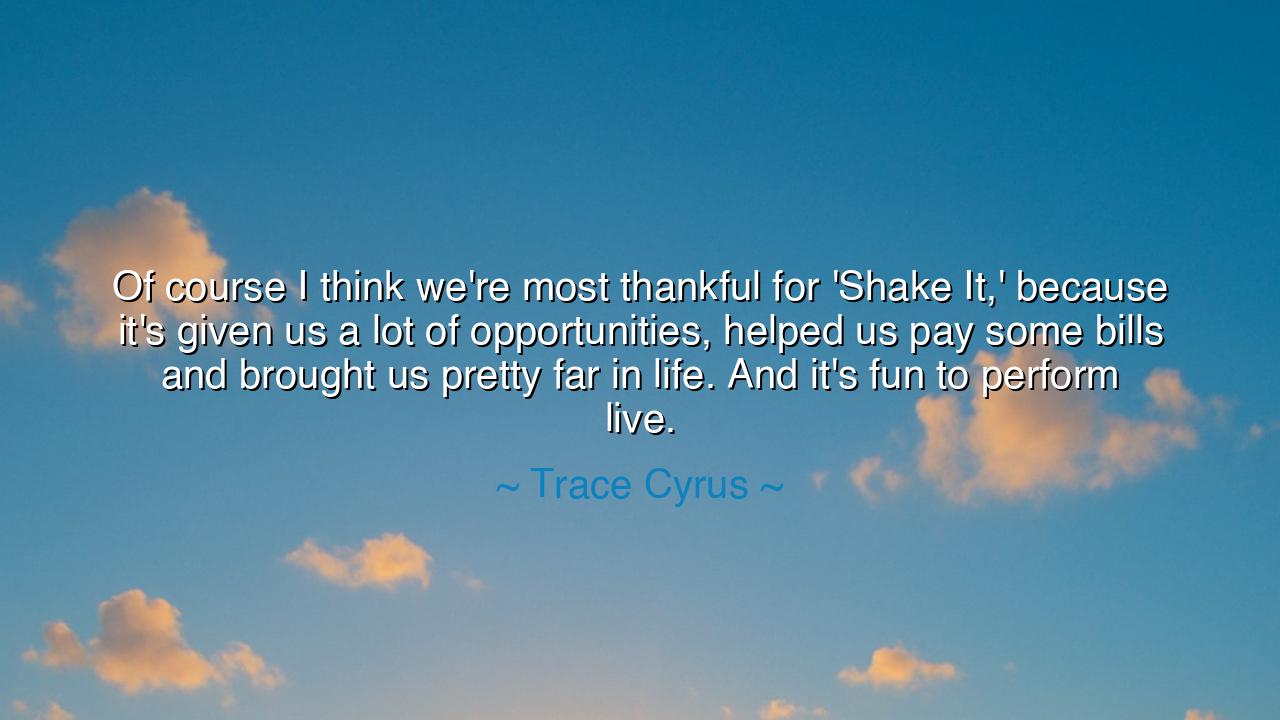
Of course I think we're most thankful for 'Shake It,' because
Of course I think we're most thankful for 'Shake It,' because it's given us a lot of opportunities, helped us pay some bills and brought us pretty far in life. And it's fun to perform live.






Trace Cyrus once reflected with sincerity: “Of course I think we’re most thankful for ‘Shake It,’ because it’s given us a lot of opportunities, helped us pay some bills and brought us pretty far in life. And it’s fun to perform live.” These words, while simple, speak of an eternal truth: that a single work of art, born in a moment of creation, can alter the course of destiny. It can open doors, sustain livelihoods, and carry its makers further than they ever dreamed. The artist, therefore, must hold such gifts not in arrogance, but in gratitude.
The ancients knew this mystery well. Homer sang his epics to the Greeks, and through his verses entire civilizations found identity, courage, and pride. A poet’s single work could echo across centuries, sustaining the spirit of nations. In the same way, Cyrus acknowledges that one song—‘Shake It’—became more than entertainment. It became a vessel of opportunity, a bridge between dream and survival, between passion and provision. To be thankful for it is to honor the unseen power of creation that can change the path of a life.
What Cyrus emphasizes is not only fame but practicality. The song helped pay bills, a reminder that art sustains both soul and body. The romantic might think music is only about glory, but the wise know it also provides bread on the table, stability for the journey. This humility in his words echoes the gratitude of craftsmen throughout history—those who, through their skill, could feed their families and ensure their survival. Gratitude, then, is not just for the beauty of the art, but for its power to sustain life itself.
Consider the story of Johannes Gutenberg. His invention of the printing press was not born of royal decree but of necessity. Yet from that single act came opportunities unimaginable: the spread of knowledge, the birth of literacy, and revolutions of thought. His “song” was not a melody but an invention, and like Cyrus’ tune, it brought him sustenance and transformed the world. Both remind us that the works we create may ripple outward far beyond their intended scope, shaping destinies in ways unseen.
There is also joy in Cyrus’ words when he says the song is “fun to perform live.” This is a profound reminder: the value of a creation is not only in the money it earns or the doors it opens, but in the delight it brings when shared. The ancients held festivals not merely to honor the gods but to rejoice in the act of community. In performance, as in ritual, joy is multiplied because it is given. Cyrus’ gratitude is not only for survival, but for the chance to connect with others in the beauty of shared experience.
The deeper meaning of his words is this: success, no matter how it comes, is to be met with humility. A single song, a single creation, may alter a life—but it is not to be boasted over, only embraced with thankfulness. For in art as in life, we are not always in control of what carries us far; sometimes it is the simplest work, the one we least expect, that becomes the foundation of our journey.
The lesson is clear. Do not despise small beginnings, nor underestimate the power of one effort, one creation, one chance. Be thankful for every door that opens, even if it seems modest, for you never know which moment will sustain you through seasons of trial. And when that moment comes, rejoice in it—not only for the opportunities it brings, but for the joy it allows you to share with others.
Practical counsel may be given. Cherish your creations, however small, and give them to the world with humility. When success comes, remember to be thankful—for opportunity, for provision, for joy. And above all, never forget to share your gift, for in sharing lies the true power of art. Thus, Cyrus’ words endure as a reminder: greatness is not only in what we create, but in the gratitude with which we receive its fruits, and the joy with which we offer it back to the world.






AAdministratorAdministrator
Welcome, honored guests. Please leave a comment, we will respond soon